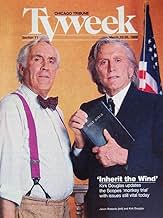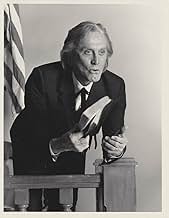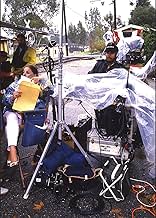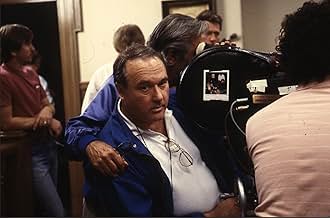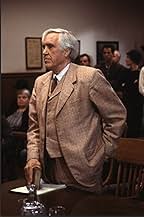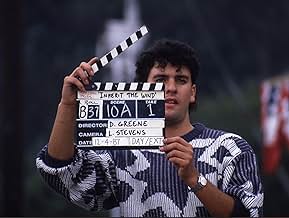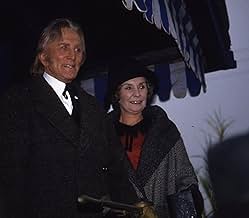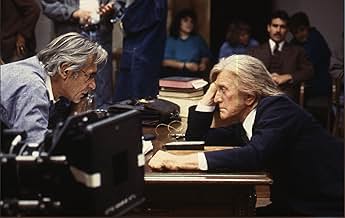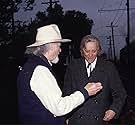Füge eine Handlung in deiner Sprache hinzuA biblical orator opposes a liberal lawyer defending a man for teaching Darwinism in the 1920s South.A biblical orator opposes a liberal lawyer defending a man for teaching Darwinism in the 1920s South.A biblical orator opposes a liberal lawyer defending a man for teaching Darwinism in the 1920s South.
- Regie
- Drehbuch
- Hauptbesetzung
- 2 Primetime Emmys gewonnen
- 2 Gewinne & 1 Nominierung insgesamt
- Bailiff
- (as Thom McCleister)
- Radio Newsman
- (as Richard Gilbert Hill)
Empfohlene Bewertungen
*** 1/2 (out of 4)
The second of three remakes of the 1960 Spencer Tracy/Frederic March film once again takes a look at the infamous Scopes trial. The film centers on a teacher who is arrested for teaching the theory of evolution. A religious prosecutor (Kirk Douglas) takes on the defender (Jason Robards) in a case about the right to think. I personally think that the 1960 film is one of the greatest movies ever made and it contains some of the most powerful actor of any movie ever made. It would be rather silly to go into the remake expecting anything as powerful but this film actually comes pretty close. The film has been slightly rewritten and it takes a look at the case from a different side but the movie remains quite powerful and contains some very good acting. The only real problem here is that the movie only runs around 96-minutes, which means we lose some character development. The actual real case has pretty much been proved as a fraud but it certainly makes for an interesting debate, which carries over very well to film. I think, like the original film, this one is a bit too one sided and shows the religious aspect unfairly but while saying this there's no doubt that the original trial showed evolution in an unfair way. As I said earlier, I think both Tracy and March delivered two of the most powerful performances in the history of film but Robards and Douglas do great work here. Douglas really gets into his character so much that you feel as if you're watching the real guy and not Douglas giving a performance. His speech in the church early on is among some of the best preaching I've seen from any actor or any real preacher. Robards was an excellent choice to go up against Douglas and he too delivers a strong performance and the two men together, during the final courtrooms scene, contain enough fireworks to really get your blood pumping. Darren McGavin, John Harkins, Megan Follows and Gene Simmons all add great supporting in their performances. In the end, this film is far from the 1960 version but it's still a very good little gem with great performances and an always interesting story.
This isn't to say its bad, its not. The problem is that compared to the original Spencer Tracy film this film comes off as a good summer stock to the originals Broadway show case.
The cast is game. Kirk Douglas is perhaps a bit odd at first as the William Jennings Bryan character, but after a few minutes he slips into the groove and all is fine. Jason Robards' is excellent, unfortunately there is something about the way this was put together for TV that kills his momentum in the home stretch.
Seeing this with out commercials doesn't help since the pauses still are there.
If its on try it, but if you must see some version of this go for one of the other two.
(1) 1960 theatrical film starring Fredric March and Spencer Tracy.
(2) 1965 made for TV film starring Ed Begley and Melvyn Douglas.
(3) 1988 made for TV film starring Kirk Douglas and Jason Robards.
(4) 1999 made for TV film starring George C. Scott and Jack Lemmon.
Something very interesting happens when these four versions are considered as one body of work. Let me explain. For simplicity, I'll refer to each version by its indicated number.
Item: Three of the eight actors who played leading roles in the four versions of IW also played the identical leading roles in either a theatrical or TV film version of Dr. Jekyll and Mr. Hyde. They are Fredric March (1), Spencer Tracy (1) and Kirk Douglas (3).
Item: Two actors who had principal roles in one version of IW also appeared in Days of Wine and Roses. The man starred in the theatrical movie version, and the woman originated the female leading role in the earlier TV version. They are Jack Lemmon (4) and Piper Laurie (4).
Item: Two actors who had principal roles in one version of IW also appeared as co-stars in the film Spartacus. They are Kirk Douglas (3) and Jean Simmons (3).
Item: Two actors who had principal roles in one version of IW also appeared as co-stars in the film The Hustler. They are George C. Scott (4) and Piper Laurie (4).
Item: Two actors who had principal roles in two different versions of IW also appeared as co-stars in the film The Hustler. They are George C. Scott (4) and Murray Hamilton (2).
Coincidence? Of course. But interesting? You bet!
Wusstest du schon
- WissenswertesThe real William Jennings Bryan ran for President three times: 1896, 1900, and 1908. Bryan was the first Presidential candidate to extensively barnstorm during a Presidential campaign in an era when most candidates did not. Although it's suggested that he might be contemplating a run in the next election, which would have been in 1928, it's highly unlikely. He did serve in public office twice - as Congressman from Nebraska from 1891 to 1895 and as Secretary of State under Woodrow Wilson from 1913 to 1915, when he resigned over the country's policy toward Germany after the Lusitania was sunk. Despite his fundamentalist Christian beliefs, he was considered as Liberal and Progressive, supporting anti-Imperialist policies and trust-busting.
- PatzerIn several courtroom scenes when the focus is on Bertram Cates, the actor, Kyle Secor, wears glasses in which you can see the reflection of the production lights as well as white flags used by the production staff to mute the lights. In the 1930s, courtrooms would have utilized electric lights with a milk glass lamp shade known as a "schoolhouse light".
- Zitate
Rachel Brown: I don't understand it, and what I do understand I don't like. I don't believe I came from apes and monkeys. You see, I really haven't thought very much. I was always afraid of what I might think. It seemed safer not to think at all. Maybe - maybe what Mr. Darwin wrote is bad. Bad or good I think ideas have to come out. I think they should be heard. I don't think they ought to pass laws against them.
- VerbindungenFeatured in The 40th Annual Primetime Emmy Awards (1988)

